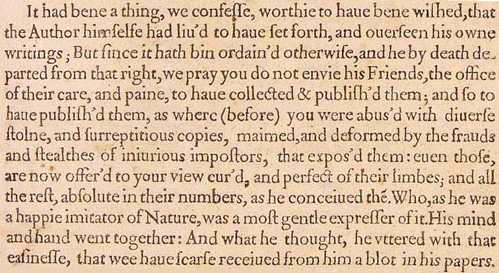Printers and "pirated" plays
The editors of the First Folio declared that earlier editions of the plays were "stolen, and surreptitious copies, maim'd and deformed by the frauds and stealths of injurious impostors, that expos'd them." (Click for the full page.) And certainly some editions may have been pirated by printers after a quick profit*. One text that is often considered the most "maim'd and deformed" of them all is the first quarto of Hamlet. So different is it from the version we recognize as being Shakespeare's mature work that it has often been labelled a "bad" quarto.
Why didn't copyright laws protect writers like Shakespeare from piracy?*
Revision or corruption?
Shakespeare's reputation for writing without revision has had a lasting effect on criticism. Only very recently have critics begun to realize that some textual problems in the plays can best be explained as the result of extensive revision. For example, King Lear exists in two very different forms, in a quarto and the First Folio; recent scholarship has suggested the possibility that the two versions may represent different stages in the writing of the play, rather than one or the other being corrupt.
See the passages from Love's Labours Lost that show signs of revision.
Footnotes
-
A quick profit?
There is, however, little evidence to show whether plays did enjoy a wide readership. We do know that relatively few were reprinted, a fact which suggests that they may not have been in great demand.
-
© W. Shakespeare
There was no copyright protection for writers, though printers could ensure that others could not print books they had the rights to, by entering them in the Stationers' Register, one of the most informative sources of data concerning printed books in the period.
Because there was no copyright, acting companies kept the manuscripts until the play lost popularity or the plague prevented performances. The result is that the most popular plays of the period are the most corrupted, since they were continually updated to keep them topical. Ben Jonson was paid five pounds by Philip Henslowe for additions to Kyd's play The Spanish Tragedy.
